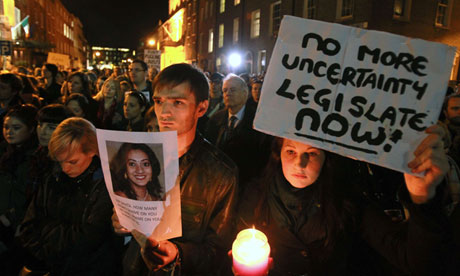
By comparison with abortion laws in much of northern Europe, the decision taken by the Irish parliament this week is a small step. But in terms of Ireland's long debate about abortion, it is a big stride. Modern Ireland has agonised over abortion for at least 30 years, ever since the right to life of the unborn was written into the constitution in 1983. In the early hours of yesterday, however, the Dáil voted by 127-31 for the government's protection of life during pregnancy bill. This is the first time Irish parliamentarians have put a right to abortion on to the statute book. It is a big moment, yet Ireland's abortion debate is anything but over.
Ireland's new law is narrowly drafted. It enshrines a woman's right to a legal abortion if her life is at risk from illness, in a medical emergency, or if there is a risk of suicide. There is no provision for a woman to have a right to an abortion following rape, or if she cannot cope physically or emotionally, or if foetal abnormalities have been detected. Nor may a woman decide for herself whether to have an abortion.
One right that is in the bill, however, is the right to go elsewhere to have an abortion. In practice, this mainly means coming to Britain. Figures this week show that almost 4,000 Irish women travelled to England and Wales for an abortion during 2012 – an average of 11 a day. One in five was coming here for the second time. According to the Irish Family Planning Association, more than 156,000 Irish women have made the journey since 1980. The tightly drawn new bill means that this mass trek will continue. Even after yesterday's vote, the Irish state is continuing to turn its face away from its own people and its own responsibilities.
The new bill at least tries to look some issues in the eye. It might not have been carried at all had it not been for the traumatic death of the 17-weeks pregnant dentist Savita Halappanavar in Galway last October. That case helped to push Ireland's Fine Gael-Labour coalition into government legislative action, for which they deserve credit. But in what remains a predominantly Catholic country, the ultra-cautious bill has caused great controversy and become to some extent a lightning rod for other discontents. Most parties in the Dáil were divided, a minister was sacked for voting against the bill, and high politics were overshadowed by a male backbencher grotesquely pulling a woman colleague on to his lap during the late-night vote.
Irish politics remain highly volatile after the banking crisis and bail-out overturned the old order in 2011. As the historic abortion bill moves towards the statute book this summer, there is not much sense of a nation newly at ease with itself either.

